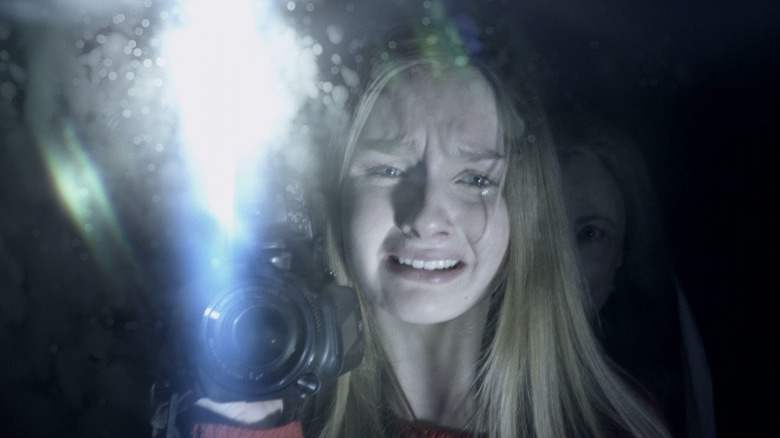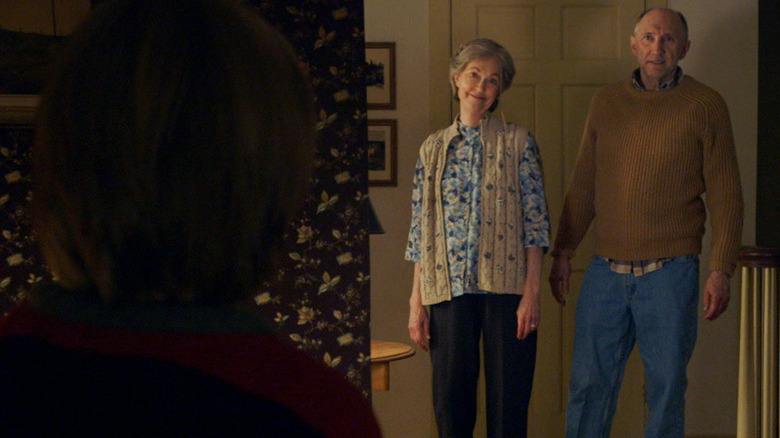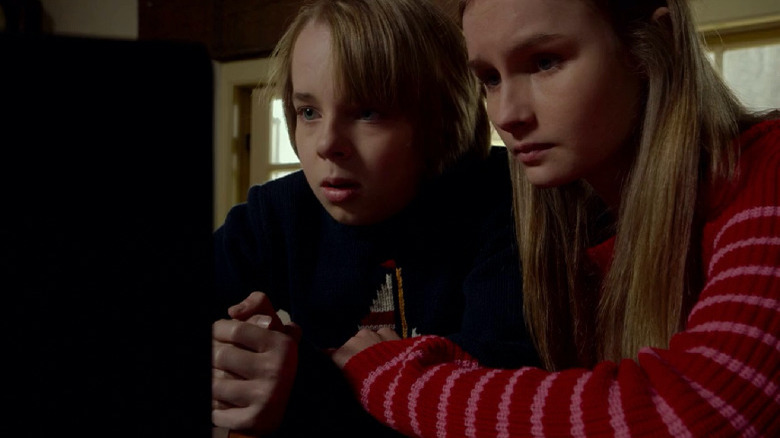The Visit Was Almost Connected To M. Night Shyamalan's Unbreakable Trilogy
This post contains spoilers for "The Visit."
M. Night Shyamalan's "The Visit" was initially titled "Sundowning," although it could've just as easily been called, "How M. Night Got His Groove Back." The 2015 film saw the "Sixth Sense" and "Signs" director return to his moody thriller roots after helming a pair of critically-panned big-budget misfires in the forms of "The Last Airbender" and "After Earth." By funding the movie on his own, Shyamalan gave himself the creative freedom to make what remains one of the weirdest and wildest creations of his career so far (which is quite the accomplishment, coming from the director of "Lady in the Water").
Framed as an amateur documentary made by 13-year-old Tyler (Ed Oxenbould) and his 15-year-old sister Becca (Olivia DeJonge), "The Visit" follows Tyler and Becca on a week-long trip to meet their estranged grandparents for the first time. Upon accompanying "Nana" (Deanna Dunagan) and "Pop Pop" (Peter McRobbie) to their remote farmhouse, Tyler and Becca are quick to realize there's something ... off about their hosts. Like so much of Shyamalan's work, "The Visit" plays out as a twisted fairy tale from there, as Tyler and Becca slowly uncover the horrifying truth: Nana and Pop Pop are actually a pair of imposters who escaped from the psychiatric hospital where their real grandparents worked and murdered them in order to take their place.
While there's no overlooking the ageism inherent to the film's premise, "The Visit" benefits from having a dark sense of humor and succeeds in keeping you wondering if there might be a supernatural explanation for Nana and Pop Pop's behavior, right up until the big twist. Ultimately, however, the movie seems to take place in a grounded universe much like our own — although, it turns out, Shyamalan very nearly retconned that years later with 2019's "Glass."
Superheroes exist... and so do evil grandparents
M. Night Shyamalan's Eastrail 177 trilogy, which gets its name from the train line that connects his 2000 film "Unbreakable" with 2017's "Split" and "Glass," resembles "The Visit" in that it starts out taking place in what appears to be the real world. Except, in that case, it turns out the trilogy's universe is home to people with super-human abilities right out of a comic book, like near-physical invulnerability and heightened intelligence. Another thing they share in common? They all take place in or near M. Night's old stomping grounds in Philadelphia, just like the vast majority of his oeuvre.
Has Shyamalan ever toyed with the idea of having all his movies exist in the same version of Philly? He was, after all, the filmmaker who recognized that superhero comic books are the modern-day equivalent of ancient mythology with "Unbreakable," a whole eight years before the Marvel Cinematic Universe took over Hollywood. Speaking to The Hollywood Reporter, M. Night admitted he wasn't ahead of the curve when it came to the shared universe trend. Still, that didn't stop him from considering making the events of "The Visit" canon to the Eastrail 177 trilogy:
"If I was smart enough to have thought about it 20-some years ago, I would've done it, but I wasn't smart enough to think about it. There was one tie-in that I almost did. It was in 'Glass' when they all got to the mental institution. I was going to tell a story about 'The Visit' and how two people escaped from that same hospital."
'I chickened out'
"Glass," as M. Night Shyamalan noted, has "Unbreakable" leads David Dunn (Bruce Willis) and Elijah Price (Samuel L. Jackson) being taken to the same psychiatric hospital, Raven Hill Memorial, as "Split" character Kevin Wendell Crumb (James McAvoy), on the grounds that their "superpowers" are really just delusions brought about by unresolved trauma and mental illness. According to Shyamalan, he came precariously close to including a direct reference to the plot of "The Visit" in his script. "I was going to do it, but I chickened out. So I didn't do it," he confessed.
Directors peppering their films with nods or direct links to their other movies is nothing unusual, mind you. Quentin Tarantino has been doing it his entire career and we don't have time to dive down the rabbit hole that is the Pixar Shared Universe theory. It's mostly just good fun, and it sounds as though Shyamalan wasn't really thinking much deeper than that with his abandoned shout-out to "The Visit" in "Glass." But might it have benefitted the movies from a creative perspective all the same?
My inclination is to say it wouldn't. "The Visit" continues Shyamalan's examination of aging, mortality, and death in his work, which extends to films like "The Sixth Sense" and "Old" but also goes back as far as his first-ever theatrical release, 1998's "Wide Awake." The movie, which was notoriously mangled by producer Harvey Weinstein in post-production, centers on Joshua (Joseph Cross), a 10-year-old boy who's thrown into a spiritual crisis by the death of his grandfather. "Wide Awake" might be a far cry from the sadistic and comedic tone of "The Visit," but so far as thematic parallels go, the pair are arguably more alike than the latter and "Glass." So maybe it's best M. Night "chickened out."


